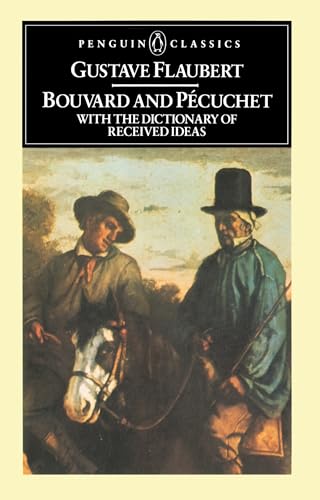Bouvard and Pecuchet with The Dictionary of Received Ideas (Penguin Classics)
Gustave Flaubert
BOOK REVIEW

In the dizzying labyrinth of human existence, where ambition, tragedy, and comedy intertwine, Gustave Flaubert's Bouvard and Pecuchet emerges as a striking commentary on our perennial quest for knowledge and self-improvement. This novel is not merely a tale of two clerks who embark on a relentless pursuit of enlightenment; it becomes a vibrant canvas that celebrates and satirizes the follies of human nature. Within its pages, readers are not just spectators; they are forced to confront the absurdity of life and the irony of intellectualism in a world tipsy with ignorance.
Flaubert crafts his characters, Bouvard and Pecuchet, with a purity that allows them to resonate deeply, embodying the earnest yet misguided desire for academic and personal growth. These two clerks, spurred by the inheritances they receive, dive headfirst into an intellectual endeavor, dabbling in various fields like philosophy, medicine, music, and even agriculture. With each new obsession, they unwittingly reveal the cracks in the human psyche - the all-too-human lust for knowledge juxtaposed with profound naivety. Flaubert, through their trials and tribulations, forces us to question: How much can we truly know, and at what cost?
The contextual backdrop of the novel, written during the late 19th century, showcases a France undergoing seismic shifts in thought and societal structure. The Scandals of the Third Republic loomed large, with the promise of modernization attempting to illuminate the nation's dark corners. Flaubert, with his keen eye, encapsulated the zeitgeist that flitted between the yearning for enlightenment and the choking grip of ignorance. It's a mirror held to society, where the absurd and the sublime coexist in a dance as chaotic as the world itself.
Readers often find themselves entangled in Flaubert's poignant prose, seduced by his sharp wit and trenchant observations. Some critics laud his ability to leap beyond mere satire, branding his work as an early exploration of the absurdist philosophy that France would later embrace. Others lament the novel's structure, citing it as disjointed-a series of vignettes rather than a cohesive narrative. But therein lies the genius! The fragmented nature mirrors the very chaos of life itself. Flaubert seduces the reader into reflecting on the futility of their pursuits, leaving them with a lingering sense of discontent and contemplation.
Many contemporary voices echo the frustration and admiration for Bouvard and Pecuchet, highlighting how its themes remain alarmingly relevant today. It's as if Flaubert has donned a fortune teller's garb, predicting the ongoing struggles of an information-saturated society that clamors for prestige while drowning in misinformation. Should we not be terrified by how contemporary life resonates with the absurdities Flaubert so masterfully depicted?
Consider how pivotal Flaubert's innovations have been for future literary giants. His piercing exploration of the human experience influenced a range of authors, from Virginia Woolf to Albert Camus, who embraced the absurdity of existence while daring to confront it head-on. It's a legacy that compels us to wrestle with our own perceptions and understanding of knowledge.
In Bouvard and Pecuchet, every page dances with irony, every reflection teeters on the edge of revelation. It's a book that dares you to engage, to wrestle with the complexities of learning while starkly reminding you of the futility that often accompanies such endeavors. Dive into its depths, for to do so is to enrich your understanding of not just the text, but perhaps your very existence in this bewildering world. 🌍 Don't let the chance to fathom Flaubert's brilliance slip through your fingers; it might just redefine the way you view knowledge, society, and yourself.
📖 Bouvard and Pecuchet with The Dictionary of Received Ideas (Penguin Classics)
✍ by Gustave Flaubert
🧾 336 pages
1976
#bouvard #pecuchet #with #dictionary #received #ideas #penguin #classics #gustave #flaubert #GustaveFlaubert